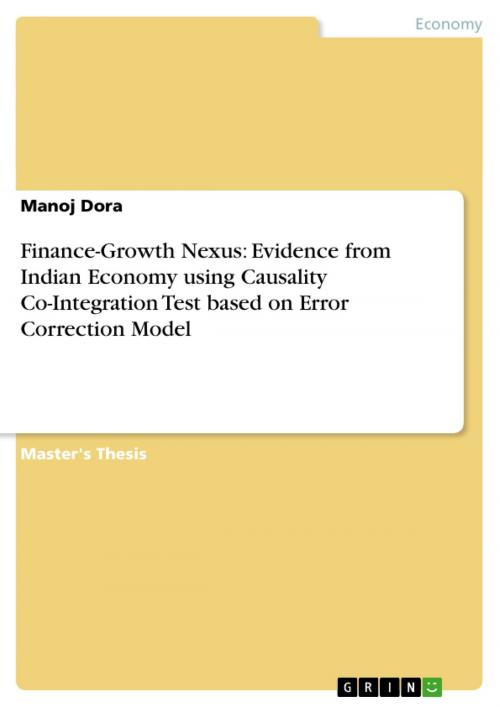Finance-Growth Nexus: Evidence from Indian Economy using Causality Co-Integration Test based on Error Correction Model
Business & Finance| Author: | Manoj Dora | ISBN: | 9783640456741 |
| Publisher: | GRIN Publishing | Publication: | October 26, 2009 |
| Imprint: | GRIN Publishing | Language: | English |
| Author: | Manoj Dora |
| ISBN: | 9783640456741 |
| Publisher: | GRIN Publishing |
| Publication: | October 26, 2009 |
| Imprint: | GRIN Publishing |
| Language: | English |
Master's Thesis from the year 2009 in the subject Business economics - General, grade: A, Vanderbilt University (Graduate Program in Economic Development), course: Masters in Economics, language: English, abstract: This study explores the relationship between financial growth and economic development in India using time series data over the period 1950-2007. The majority of the previous studies on this subject have used cross-sectional data, which may not address country specific issues. In addition, many studies used either OLS technique of estimation or bi-variate causality test and may, therefore suffer from the omission-of variable bias. This study attempts to examine the dynamic relationship between financial growth and economic development by including a range of financial variables like, quasi money for monetization, domestic credit for financial intermediation activities and bank asset for financial intermediary institutions. The casual relationship between economic development and financial growth indicators was examined with the help of Granger-Causality procedure based on Unrestricted Vector Auto Regression using the error correction term. The result from the cointegration tests indicates that financial development has a long-run equilibrium with economic growth. The financial sector and real sector move and evolve together in the same direction. The error correction model suggests that, in the short-run, the output variable is the only effective adjustment factor in the system that responds to the fluctuations of financial measures and domestic capital formation. On the other hand, the response of financial intensities and investments are sluggish adjustments that correct the deviation from equilibrium. In nutshell, this study shows that India's financial development and economic growth are positively correlated; the process of economic development is not sustainable without the contributions of the financial sector and vice versa.
Master's Thesis from the year 2009 in the subject Business economics - General, grade: A, Vanderbilt University (Graduate Program in Economic Development), course: Masters in Economics, language: English, abstract: This study explores the relationship between financial growth and economic development in India using time series data over the period 1950-2007. The majority of the previous studies on this subject have used cross-sectional data, which may not address country specific issues. In addition, many studies used either OLS technique of estimation or bi-variate causality test and may, therefore suffer from the omission-of variable bias. This study attempts to examine the dynamic relationship between financial growth and economic development by including a range of financial variables like, quasi money for monetization, domestic credit for financial intermediation activities and bank asset for financial intermediary institutions. The casual relationship between economic development and financial growth indicators was examined with the help of Granger-Causality procedure based on Unrestricted Vector Auto Regression using the error correction term. The result from the cointegration tests indicates that financial development has a long-run equilibrium with economic growth. The financial sector and real sector move and evolve together in the same direction. The error correction model suggests that, in the short-run, the output variable is the only effective adjustment factor in the system that responds to the fluctuations of financial measures and domestic capital formation. On the other hand, the response of financial intensities and investments are sluggish adjustments that correct the deviation from equilibrium. In nutshell, this study shows that India's financial development and economic growth are positively correlated; the process of economic development is not sustainable without the contributions of the financial sector and vice versa.















